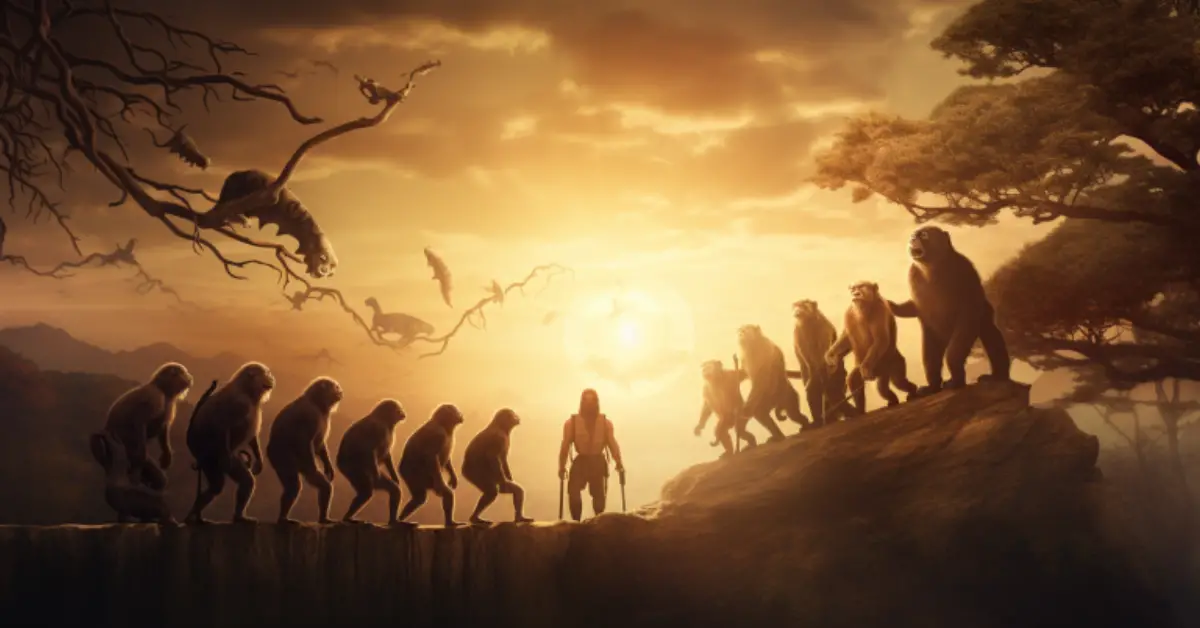The Bible doesn’t directly mention evolution as we understand it today. Rather, it narrates the creation story in the Book of Genesis. While some interpret this as literal, others see it as symbolic. It’s vital to understand that the primary purpose of the Bible is to convey spiritual truths and our relationship with God, including the role of sin and the hope provided through Jesus.
Now, for those of you intrigued about the intricacies, let’s dive deep!
What Does the Bible Say About Evolution?
The Bible, in its essence, is a collection of spiritual teachings, morals, and stories to guide humanity in their relationship with God. When approaching the topic of evolution, the Bible does not use the modern scientific terms or explanations we’re familiar with. The closest it comes to discussing creation is in the Book of Genesis.
The first chapter of Genesis describes a six-day creation process, culminating in the creation of humans. Some believers interpret this account literally, believing the world was made in six 24-hour days. Others see it as a poetic or symbolic representation, suggesting that “days” might refer to longer periods or epochs.
Considering the Bible’s main focus is on spiritual matters, like the nature of sin and the redemptive power of Jesus, the specifics of how life arose might not be its primary concern. The New Testament, for instance, focuses more on Jesus’s teachings and the establishment of the early Christian church.
God’s view on the matter? Well, that’s up to interpretation. Some argue that since God is the creator of all, evolution could simply be the mechanism He used. Others feel that the Bible’s account stands firm against evolutionary theory. What’s important to remember is that many Christians have found ways to reconcile their faith with the scientific understanding of evolution, believing that the two aren’t necessarily in conflict.
Bible Verses About Evolution
- Genesis 1:1 – “In the beginning, God created the heavens and the earth.” This foundational verse speaks to God’s role as the creator. It doesn’t delve into specifics but sets the stage for the subsequent creation narrative.
- Genesis 1:27 – “So God created man in his own image, in the image of God he created him; male and female he created them.” This verse emphasizes the special relationship between God and humanity. It suggests that humans have a unique position in the created world.
- Genesis 2:7 – “Then the Lord God formed a man from the dust of the ground and breathed into his nostrils the breath of life, and the man became a living being.” This more detailed account of human creation has been interpreted in various ways: from a literal formation from the dust to a symbolic representation of life’s fragility.
- Genesis 5:1-2 – “When God created mankind, he made them in the likeness of God. He created them male and female and blessed them. And he named them ‘Mankind’ when they were created.” This passage reiterates the idea of humans being uniquely created in God’s image.
- Psalm 104:24-30 – A psalm that praises God’s creation and His renewing of the earth. It doesn’t directly discuss evolution but underscores the idea that God is actively involved in sustaining life.
- John 1:3 – “Through him all things were made; without him nothing was made that has been made.” This New Testament verse speaks to Jesus’s role in creation, reaffirming the idea that all existence is through God.
- Colossians 1:16 – “For in him all things were created: things in heaven and on earth, visible and invisible, whether thrones or powers or rulers or authorities; all things have been created through him and for him.” This verse emphasizes that all creation is not just by Jesus but also for Him, showing the intimate connection between God and creation.
- Acts 17:26 – “From one man he made all the nations, that they should inhabit the whole earth; and he marked out their appointed times in history and the boundaries of their lands.” This verse speaks to human unity and shared ancestry, a sentiment echoed in modern understandings of evolution.
- Romans 1:20 – “For since the creation of the world God’s invisible qualities – his eternal power and divine nature – have been clearly seen, being understood from what has been made, so that people are without excuse.” This verse suggests that God’s nature is evident in creation, which might imply that studying the natural world, including evolution, can lead to a deeper understanding of God.
- Hebrews 11:3 – “By faith we understand that the universe was formed at God’s command, so that what is seen was not made out of what was visible.” This verse touches on the idea of faith and belief in things unseen – an important aspect of the Christian faith.
These verses, while not addressing evolution directly, provide a framework for understanding the Bible’s perspective on creation and God’s role in it. The relationship between the Bible and evolution remains a topic of discussion, but it’s clear that for many, faith and science can coexist harmoniously.


